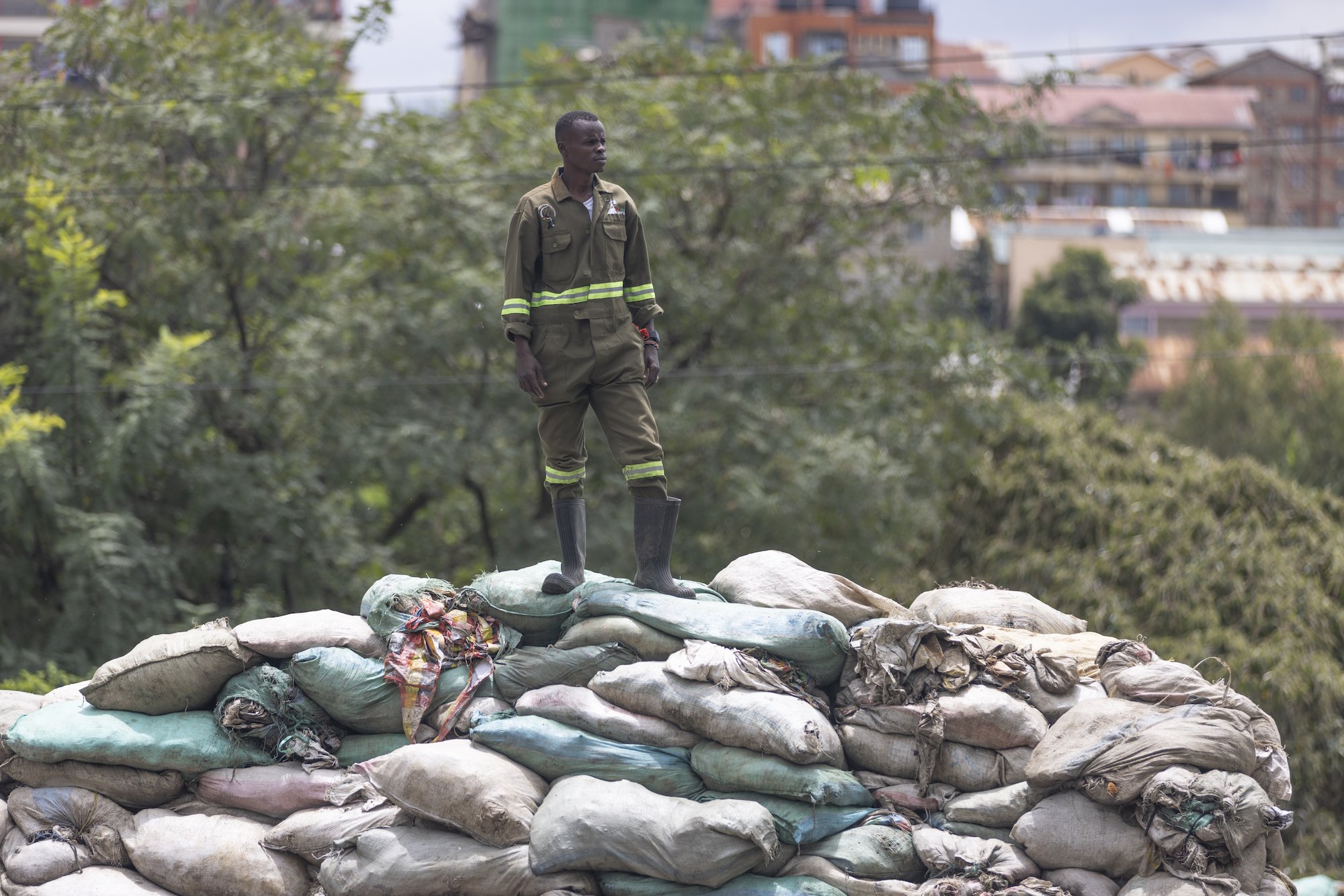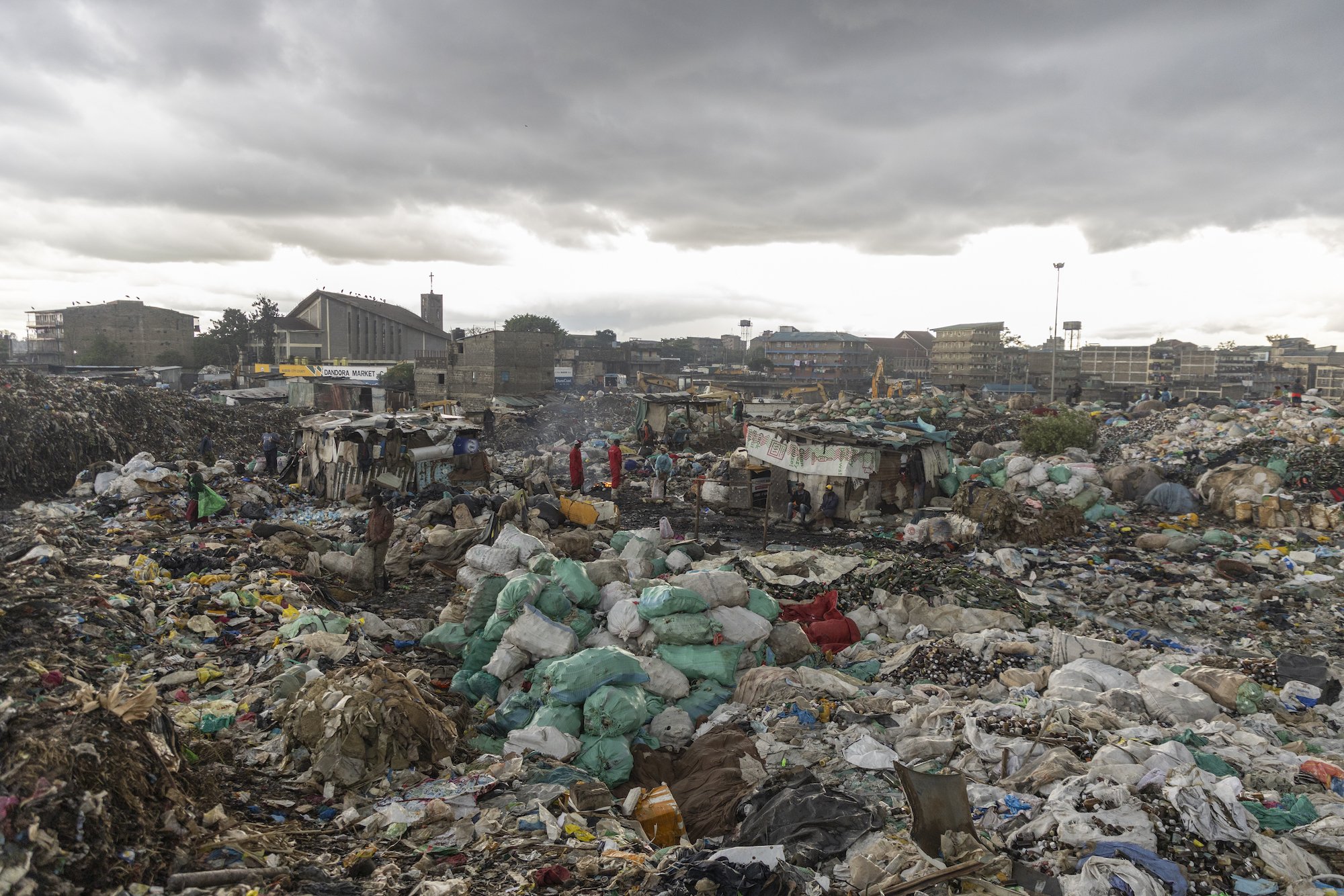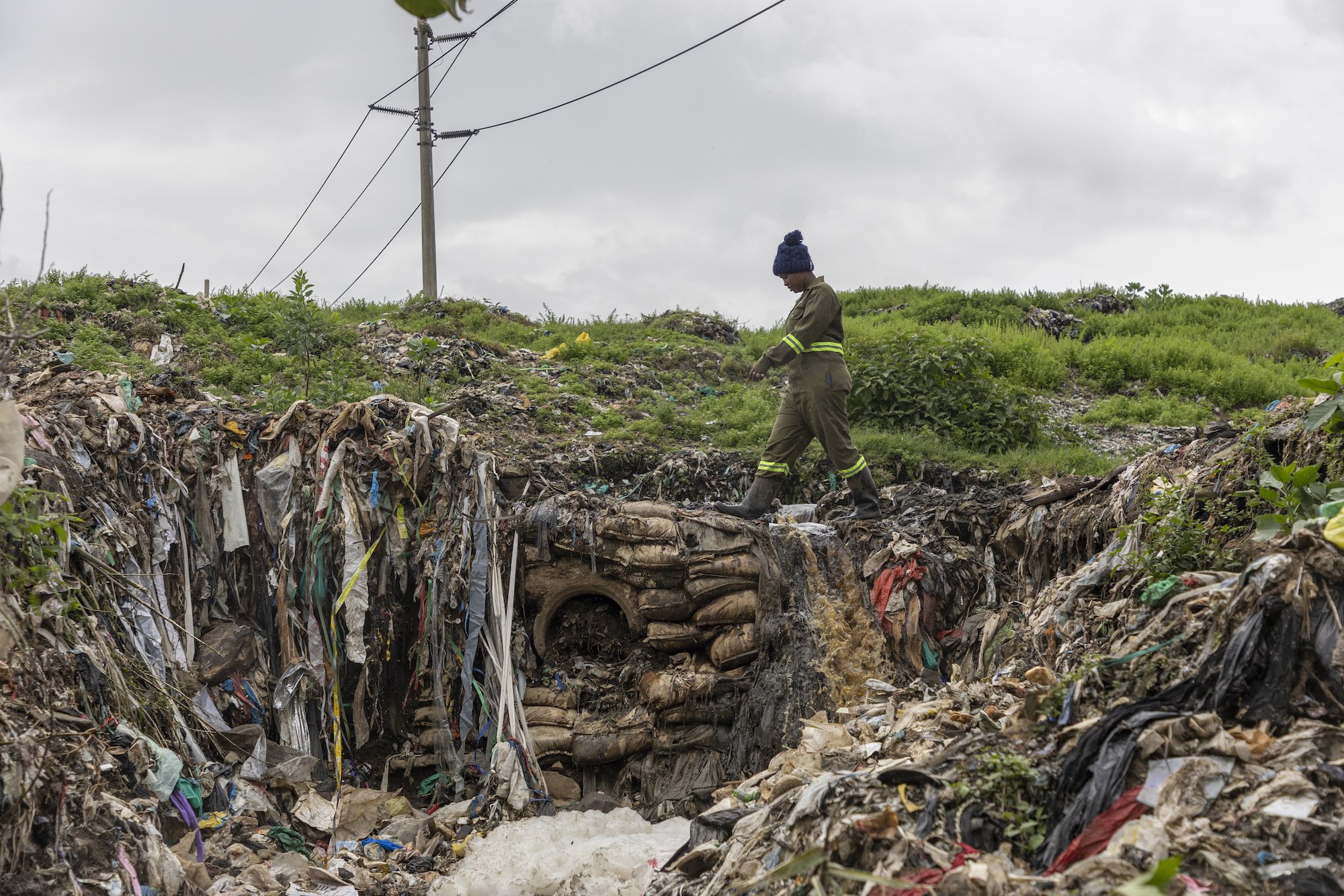“You might be an environmentalist. You might be a person who is against pollution. But if you are not talking about waste pickers, you are not talking about everything.”
Solomon Njoroge is a waste picker at Dandora, a sprawling 40-acre dump site in Nairobi, Kenya, and one of the largest in Africa. Initially opened in 1975 with World Bank funds, it was deemed “full” over 20 years ago. Yet, it continues to be run by cartel gangs, receiving over 2,000 metric tonnes of waste each day that over 8,000 waste pickers hunt through, often with bare hands, triaging for items that can be reused or recycled.
“In the landfill, there are many different types of plastics: PET, HTP, PVC, cartons… We don’t call this waste because waste has no value.” Njoroge says. “Anything that has value is what we collect. Even the food waste we give to animals such as pigs, ducks, and chickens.”
According to the UN Environment Programme (UNEP), there are approximately 20 million waste pickers worldwide, an informal army of recyclers who are responsible for 60% of the plastic recycled across the world.
Yet, waste pickers are ghost workers, unrecognized, unprotected, and discriminated against.
"Being a waste picker is work that is normally looked down on in our communities. When people see you working as a waste picker, they don't see you as a normal person. They don't consider your work as any other job. We are stigmatized. We are called names [like] scavengers. [Most people] don't see that we should be recognized," says Njoroge.
 Solomon Njoroge, Chairman of the Waste Pickers Association of Kenya at the Dandora dump site in Nairobi, Kenya.
Solomon Njoroge, Chairman of the Waste Pickers Association of Kenya at the Dandora dump site in Nairobi, Kenya.
With no ability to access healthcare, they succumb to infections, lung diseases, and cancer from living amid toxic waste, inhaling smoke from burning plastic, and scraping a living in some of the worst conditions possible.
As far back as 2007, the United Nations Environment Program (UNEP) has been sounding the alarm that the Dandora dump poses serious health threats to those working and living there and nearby. Their report, ‘Implications of the Dandora Municipal Dumping Site in Nairobi, Kenya,’ stated that skin disorders, cancers, respiratory abnormalities, and blood disorders were just some of the public health effects resulting from environmental pollution emanating from the site.
Joyce Wangari, also a waste picker at Dandora, can attest to this. She says: “The toxins inside the dump site are very strong. I know many women who have difficulty breathing. I know a mother who has had twins with asthma. That’s the toxic air she breathed when she was pregnant.”
 Joyce Wangari, Secretary of the Waste Pickers Association of Kenya at the Dandora dump site in Nairobi, Kenya.
Joyce Wangari, Secretary of the Waste Pickers Association of Kenya at the Dandora dump site in Nairobi, Kenya.
“I usually receive my period every three months, yet I am not on contraceptives,” she continued. “However, at one point, I had a head injury and had to change my environment for three months. I also got my period in those three months.”
What’s being burned at Dandora is what Njoroge would call waste: materials that cannot be recycled or resold and, therefore, have no value. Among the major culprits here is plastic and there are mountains of it. This is why Njoroge refers to the site as a cemetery. “Having a lot of non-recyclables is like having bodies. Yet, a cemetery is better because people decay and become manure. They are profitable to the environment,” he says.
Plastic, on the other hand, never truly decomposes. It just gets smaller and smaller until it’s eventually small enough to enter our bodies and poison us. Yet, the world continues to produce it at break-neck speed. According to the United Nations Development Programme (UNDP), the world currently produces a staggering 430 million metric tons of new plastics every year, and this is forecast to increase a whopping 70% by 2040.
Can’t we just recycle it? The short answer is: no.
While recycling is important, it’s no silver bullet. According to the OECD’s Global Plastics Outlook Database, just 9% of the plastic ever produced has been recycled, with another 19% incinerated; 50% ends up in landfills; and 22% evades waste management systems entirely by going into uncontrolled dumpsites, being burned in open pits, or being dropped into oceans, rivers, and lakes, especially in poorer countries.
This year, nearly 150 governments have been meeting to discuss the first-ever global treaty on plastic pollution, and the Kenya Waste Pickers Association is fighting for their voices to be heard and their historic contributions to the war on plastic pollution to be recognized. John Chweya, the President of the Association, Njoroge, the Chairman, and Wangari, its Treasurer, are on the frontlines of this David and Goliath tale.
 The Dandora dump site in Nairobi, Kenya.
The Dandora dump site in Nairobi, Kenya.
“[Before we started the Association] we never had to express ourselves or speak for ourselves. We were never involved in decision-making. Policies are made for waste pickers without any waste pickers being there. But we are the real players of the environment,” says Njoroge.
Indeed, one attempt by the Kenya government to curb the amount of waste sent to dump sites is the Extended Producer Responsibility law, a framework designed to hold producers accountable for the entire lifecycle of their products. In theory, it’s a significant stride towards environmental sustainability.
“Such regulations, however, do not take into account that there is an entire informal sector that depends on the recovery of these materials and their sale,” said Charles Maina, Senior Associate at Tearfund. This organization is part of the Renew Our World and #BreakFreeFromPlastics coalitions. ”It’s an invisible sector to policymakers. Waste pickers are not anywhere in the regulations. When they are not visible in policy and acknowledged, they are invisible to everyone.”
“A big part of the treaty is the just transition: to ensure that the treaty includes provisions for people who depend on plastic as a livelihood,” added Maina.
Representing the voices of waste pickers in Kenya at the latest Intergovernmental Negotiating Committee (INC-4) plastic pollution talks in Ottawa, Canada, Chweya said: “The systems around plastic are the systems that should incorporate the realities, the lived experiences and the historical debt of waste pickers. [We need] a just transition, particularly for waste pickers, because waste pickers are working at the very front line of the plastic crisis. This treaty is a matter of life to us because pollution brought about by this situation is killing us.”
While Chweya, Njoroge, and Wangari fight tooth and nail for a robust treaty that implements a just transition for waste pickers, the fossil fuel industry — responsible for 98% of plastic production — has also been hard at work, attempting to drown out their voices and undermine the negotiations.
 Joyce Wangari, Secretary of the Waste Pickers Association of Kenya at the Dandora dump site in Nairobi, Kenya.
Joyce Wangari, Secretary of the Waste Pickers Association of Kenya at the Dandora dump site in Nairobi, Kenya.
According to the Center for International Environmental Law (CIEL), more lobbyists for the fossil fuel and chemical industry registered for the talks at the INC-4 than there were representatives of the EU delegations.).
“The reality is,” said Maina, “that the industry has so much power. We’re talking about Big Oil. Their huge industry interests usually overpower the interests of the less powerful.”
Indeed, delegates at the INC-4 dismissed a motion to reduce plastic production by 40% in the next 15 years.
The final round of negotiations will take place in South Korea later this year.